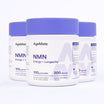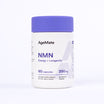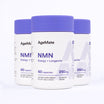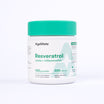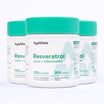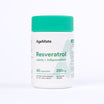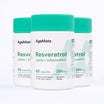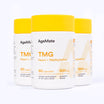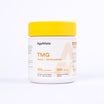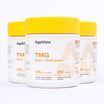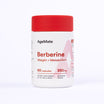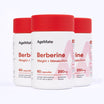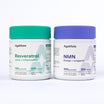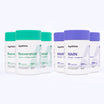Key Takeaways
- Multivitamins can help fill nutrient gaps in modern diets, supporting optimal health and longevity.
- A well-balanced diet should always be the foundation of good health, with multivitamins serving as a complement, not a replacement.
- Certain vitamins, including vitamin B12, folate, vitamin C, and vitamin D, play key roles in energy production, brain health, and immune function.
You’ve probably heard that taking a daily multivitamin can boost your health, but is it really necessary? In a perfect world, a balanced diet would provide all the essential nutrients you need. Whole foods, including fresh fruits, vegetables, lean proteins, and healthy fats, offer a wide range of vitamins, minerals, and phytonutrients that work synergistically in the body.
However, modern food processing, soil depletion, and lifestyle factors can make it difficult to hit optimal nutrient levels. This is where multivitamins step in—not as a substitute for a nutritious diet, but as a supplement to enhance and support your overall health and longevity.

How Multivitamins Can Support Longevity
A well-formulated multivitamin can provide key nutrients that support energy, brain function, cardiovascular health, and immune resilience. However, it is essential to remember that no supplement can replace the benefits of a whole-food, nutrient-dense diet. Let’s take a look at some of the standout vitamins and minerals found in a high-quality supplement and how they complement a healthy diet to promote overall well-being.
Vitamin B12 (as Methylcobalamin) – Energy and Brain Function
Vitamin B12 is essential for red blood cell formation, DNA synthesis, and neurological function. A deficiency can lead to fatigue, brain fog, and even irreversible nerve damage. In its methylcobalamin form, B12 is highly bioavailable and readily absorbed by the body (R).
Although B12 is primarily found in animal products like meat, eggs, and dairy, vegetarians and vegans may struggle to obtain enough from diet alone. This is where supplementation becomes crucial in ensuring optimal cognitive and energy levels (R).
Vitamin C (Ascorbic Acid) – Immune and Skin Health
Vitamin C is one of the most well-known antioxidants, playing a vital role in immune defence, collagen production, and cellular protection against oxidative stress. Whole foods such as citrus fruits, berries, and capsicum are excellent sources of vitamin C, but supplementing can help ensure you meet your daily needs, especially during times of increased stress or illness (R).
Folate (as 5-MTHF) – DNA Repair and Methylation
Folate is crucial for DNA synthesis, methylation, and red blood cell production. Unlike synthetic folic acid, the bioactive 5-MTHF form is readily utilised by the body, reducing the risk of unmetabolised folic acid accumulation, which has been linked to health concerns (R).
Dark leafy greens, legumes, and avocados are rich dietary sources of folate, but supplementation can help individuals who have increased needs, such as pregnant women or those with genetic variations affecting folate metabolism.

Vitamin D3 and Vitamin K2 – The Perfect Pair for Bone and Heart Health
Vitamin D3 (1,000 IU per serving) is essential for calcium absorption, bone density, and immune function. While sunlight exposure is the best natural source of vitamin D, many people, especially those who spend most of their time indoors, may struggle to maintain adequate levels (R).
Paired with vitamin K2 (MK-7), which directs calcium into bones rather than arteries, this combination reduces the risk of arterial calcification and enhances skeletal health. Foods like fatty fish, egg yolks, and fermented dairy products contain these vitamins, but supplementation ensures consistent intake, particularly for those with limited sun exposure (R).
Magnesium (as Magnesium Malate) – Muscle and Nervous System Support
Magnesium is involved in over 300 enzymatic reactions in the body, including muscle relaxation, nerve function, and energy metabolism. Whole food sources include nuts, seeds, legumes, and dark chocolate, but many people fall short of their daily magnesium needs.
Magnesium malate, the form used in this supplement, is highly bioavailable and can help reduce muscle cramps, improve sleep quality, and support metabolic health (R).
Supplementing with magnesium is particularly beneficial for those with high stress levels, athletes, or individuals with digestive conditions that affect absorption.
Do Multivitamins Work? The Science Behind Supplementation
While some studies question the effectiveness of multivitamins, others demonstrate significant benefits, especially for individuals with nutrient deficiencies or increased nutritional needs. However, these supplements should always be viewed as an addition to—not a replacement for—a well-rounded diet. Here’s what the research says:
- A meta-analysis of 21 studies found that multivitamin use was associated with a reduced risk of cancer in men (R).
- Another study showed that daily multivitamin supplementation improved memory and cognitive function in older adults (R).
- Research on vitamin D and K2 indicates that supplementation can reduce the risk of osteoporosis and cardiovascular disease (R).
Whole foods provide a complex network of nutrients, fibre, and phytochemicals that work together to optimise health. Supplements are most effective when used strategically to complement, rather than compensate for, poor dietary choices.
How to Choose the Right Multivitamin
Not all multivitamins are created equal. To get the most out of your supplement, consider the following:
✔ Bioavailability – Look for activated forms like methylcobalamin (B12), 5-MTHF (folate), and MK-7 (vitamin K2) for optimal absorption.
✔ Dosage – Ensure that dosages align with research-backed recommendations, avoiding products with excessive amounts of certain nutrients.
✔ Quality Ingredients – Seek out supplements free from artificial colours, synthetic fillers, and unnecessary additives.
✔ Third-Party Testing – Choose brands (like ours) that test for purity and potency to ensure you’re getting what’s on the label.
Should You Take a Multivitamin?
A nutrient-dense diet should always come first, but even the healthiest eaters may benefit from targeted supplementation. Nutrients like vitamin B12, folate, magnesium, and vitamin D3 are crucial for various bodily functions, and a well-formulated multivitamin can help fill nutritional gaps.

Multivitamins aren’t a substitute for whole, nourishing foods, but they can be a valuable tool in supporting longevity and optimal health. By prioritising a diet rich in fresh, unprocessed foods and using supplements as a strategic addition, you can ensure your body gets the nutrients it needs to thrive.
Want to learn more about multivitamins? Read our blog: How Long Does It Take for Multivitamins to Start Working?



